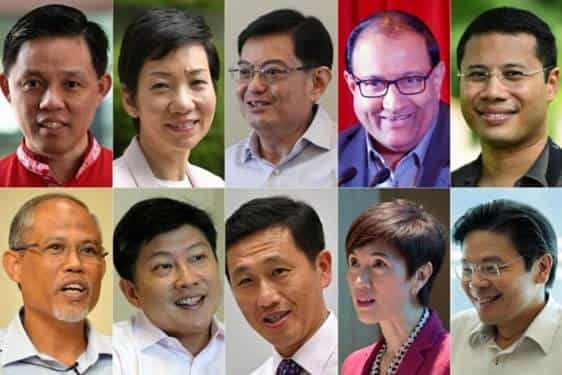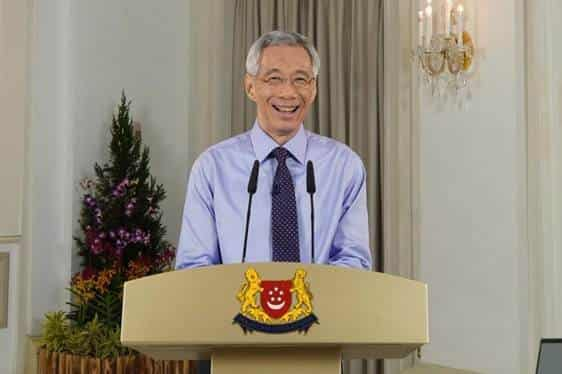
One crucial quality of any great leader is finding a successor. With the right successor, the ship will sail smoothly to its destination. With the wrong choice, however, the ship will end up like the Titanic – at the bottom of the ocean. If you think Singapore’s most urgent task is handling Covid-19, you are mistaken. It’s finding a successor to PM Lee Hsien Loong, as he is preparing to step down. In order to do so he is looking to find a “4G” (4th generation) team to lead the country. Lee Kuan Yew was the 1st generation, Goh Chok Tong was the 2nd and Lee Hsien Loong is currently the 3rd. The 4G team will need to navigate this regional trading hub towards a post-pandemic world amidst the fraught US-China tension. A lot is at stake here; Singaporeans are understandably anxious. Even I, sitting at my desk in Chiang Mai, can feel “the force” emanating from Singapore (if you are a Star Wars fan).
The good thing about Singapore is that it is a ‘rational’ country. It runs the country like MBA professionals, with underlying scientific principles. Lee Hsien Loong announced that he would step aside before his 70th birthday next year. Now most people had anticipated this top job would go to the 60-year-old Deputy PM Heng Swee Keat. But to many people’s surprise he declined, saying he wanted a younger leader to hone skills for leadership.
Understand this: Like China, Singapore has a strategic long-term lens. Its five-year parliamentary election cycle is a blink of an eye for them. And probably like China, it sees the US congress as dysfunctional where the House and the Senate are forever preoccupied with mid-term and reelection cycles. With a long-term lens, big things, including mega projects, can be accomplished. Let’s assume hypothetically that Heng Swee Keat gets the top job. By the time he settles down and his effort bears fruit, he would most likely be 70, his energy depleting. Added to this is the fact that Singaporean youngsters today grew up in a different environment from the 1G team. Poverty has been eradicated; but aspirations are rising. Which means Singapore needs a younger leader to help them realise their aspirations.
To all Singaporeans, I’m writing this to say you’re in good hands. You have a top-notch pool of candidates. The cream of the crop. It’s like selecting A+ students for graduate schools, as follows:
Chan Chun Sing – Minister for Education;
Ong Ye Kung – Minister for Health;
Lawrence Wong – Minister for Finance;
Desmond Lee – Minister for National Development;
Tan Chuan-Jin – the Parliamentary speaker.
Moreover, Lee Hsien Loong and Heng Swee Keat won’t be retiring to Maldives, sipping Singapore Sling or Mai Tai anytime soon. They will remain in government to help steer the ship and manage the macro issues.
Granted, Lee Hsien Loong might hold on to the premiership a little longer due to the unexpected pandemic, which has derailed the succession. Nevertheless, my suggestion is he step aside before the next general election by 2025. This would send strong signals to the international community that Singapore belongs to millions of talented and hardworking Singaporeans. That Singapore will pick the best to lead the country through meritocracy. That Singapore remains a beacon of hope for the ASEAN community.
Onto the Land of Smiles: here is the bitter medicine: Any one candidate I mentioned above is much more qualified than any five Thai ministers put together. In Singapore, the government will persuade and charm leaders from private sector to enter government – the best and the brightest with a proven track-record. Not because they come from hi-so families, or play golf with the generals, but through merit. In Thailand, it’s about negotiation: “I’ll deliver you X amount per month in exchange for a Deputy Minister position”. Or “Your time in this Ministry is up. My turn to dine.” They rotate ministries like they are sharing an apple pie.
Which brings me to this – politics should be boring. What do I mean by that? When there are a lot of political dramas in the Thai parliament, as there are in the US congress, things don’t get done. Bills don’t get passed, issues are stalled, unemployment rises. When politics is boring, it means things are working as they should. Bills get passed, consensus is reached, laws are enforced, taxes are paid, jobs are filled, and people continue to hum along uninterrupted by political intrigues. Less drama. More productivity. This is what Thai politicians should learn from their Singaporean counterparts.
So, repeat this mantra after me: Less drama. More productivity. More long-term lens.
Another trick Thais should learn from Singapore is letting civilian leaders run the Ministry of Defense. Singapore’s current Defense Minister is Ng Eng Hen, who assumed office in 2011. Before entering politics, he was a medical surgeon and oncologist! Nothing to do with war and conflicts. Defense, analytically speaking, is about managing troops’ resources and strategising. The Chinese war strategist Sun Tzu was more a philosopher/strategist than a soldier. It’s brain over brawn. Mental power over firepower. Neurons over nuclear bombs. You got that? Capish? The day a Thai civilian leader can lead the army will be the day Thailand finds peace and prosperity, with mutual trust on both sides. To put it another way, the Thai military doesn’t have much faith in Thai politicians, and vice-versa.
So why will Singapore’s next leadership team matter to ASEAN? Because with Hong Kong in the arms of China, Singapore remains the only Asian financial and trading hub connecting the East and the West. It should and will have a bigger role in determining the direction of ASEAN. Whether ASEAN will turn into ‘mango dictators’, ‘papaya warlords’, or regional leaders united in tackling global problems will depend on Singapore’s guidance. In my view, Singapore is the only remaining ‘rational tiger’ left in the region. Her neighbours are wrought with coups, religious extremism, tribalism, corruption, and poverty – unable to see past their immediate environment. Most important, is Singapore’s deep interest in managing US-China relations smoothly. Why? Its survival depends on it. The US and China are the largest investors in Singapore. Likewise, Singapore is the largest investor in China in addition to China being its largest trading partner.
I will conclude with the following: The former Chinese premier Deng Xiaoping once asked Lee Kuan Yew “How can we be rich like you?” Lee showed them the way by advising them to reform and open their economy. As a result, today China is an economic powerhouse. The same goes for many statesmen, including Henry Kissinger, who had sought and found invaluable advice from Lee on all matters concerning the East. As such, Singapore will remain the nexus of East-West for the foreseeable future.
I wish them the best of luck in finding the 4G team.
